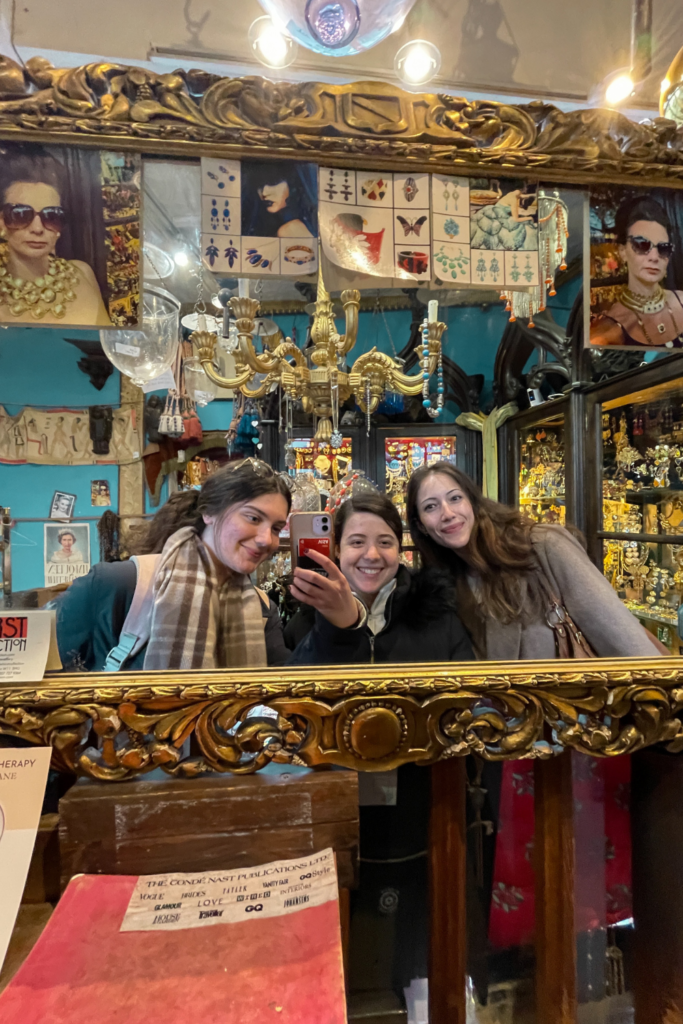Top 10 Study Abroad Tips for Beginner Travelers

So, You Want To Study Abroad?
If you’re reading this post, chances are you might be planning your upcoming study abroad trip or have considered the thought of studying abroad. You might be thinking, “What do I pack?” “How am I going to be able to see everything I want to see in such a short amount of time?” “What if I feel lonely and don’t make friends?” In this post, I’ll be sharing my best study abroad tips & advice for beginners!
I want you to know that all of these thoughts are 100% valid, and these are the exact thoughts that I had when planning my study abroad trip to Oxford University in England. After being here for exactly one month, I’ve compiled a list of my top 10 tips and pieces of advice on things I wish I knew before starting this journey. Some of these tips I learned the hard way, and I don’t want you to have to experience them. However, I want you to know that whatever challenges you may encounter, you will learn something about yourself from these experiences.
Whether you are a university student or looking to live abroad in general, these top 10 tips are sure to help you get started on your study abroad journey:
- Completing Academic Paperwork
It is crucial that you get all of your paperwork done before your trip. I had no idea how much paperwork and signatures I had to get on different documents to get approved to study abroad. The study abroad office at my university was not helpful at all! While paperwork may vary per study abroad program, you can expect to fill out forms like a transient course approval form, a medical health clearance form (which requires you to go to the doctor’s and physically get cleared), international student insurance forms, etc. And the most exciting part is that they all require multiple signatures!
I highly recommend starting to complete any forms as soon as you get them, since you will have to wait on these signatures. This was by far the most stressful part of my journey and almost made me want to quit altogether. If you feel that your home university is not helping you, contact the university’s international student office and ask them for help! - Medications & Contacting Insurance
The second most challenging part of my study abroad journey was getting all my medications in order. This is actually a challenge I am still facing, so I highly recommend getting a head start on this. If you’re like me and take a lot of supplements and pills, you’ll need to calculate how many days you’ll be away and compare that amount to what you currently have. For most of my medications, I was able to have my doctors put in prescription orders for 90 days at the pharmacy. However, you will need to contact your insurance company before hand to let them know you are studying abroad, and this is the reason you will need a large supply of the medication. Every insurance policy is different; some will approve it with no problem, others will give you problems.
If, for whatever reason, you are not able to get your prescription before you leave (like me), there are some options. You can have your parents or guardians pick it up and ship it to you. Another option is contacting your study abroad office at the university you’re visiting. Most of them will have a doctor or office that specifically handles medications for international students; this is where those travel insurance documents come in handy! - Contacting the Bank & Budgeting
While some banks nowadays don’t require you to let them know you are traveling, I still recommend doing so, especially if it’s for a longer time. The worst feeling is getting to the place you’re visiting and trying to take out money, and your card gets declined! Do some basic Google research on the currency of the place you’re visiting—what do the bills look like? The coins? Locate your nearest ATM before hand so you feel somewhat prepared.
Chances are, you are going to want to buy a lot of things (like me), and I really wish I had set a more concrete budget before I left on this trip. For the first 2 weeks, I felt the tourist craze of wanting to buy souvenirs, eat out at different restaurants, and go on tours and excursions, and the costs started to add up. In my head, I kept saying, “I’m on vacation; it’s ok.” But when you’re studying abroad, you aren’t really on vacation! You are living there and will need money to sustain you for months. Obviously, everyone’s budget is different, but just do some thinking on this before you leave! - Pack YOUR Essentials
Something I am currently learning this week is that I really wish I brought my tampons from home. Yes, I know what you’re thinking. “You could just buy those there.” That’s what I thought too, and I was definitely wrong to assume this. Tampons are in fact different in every country; even if they are the same brand you are similar to, the product itself can be manufactured differently. I am currently learning this the hard way, and my roommates and I are all panicking trying to figure out how to use English tampons.
Now, maybe you don’t need to bring tampons, but the point is, pack your essentials that you need to be comfortable. Maybe it’s a certain type of coffee that you need to have in the morning or a certain type of shampoo; even general medications are different abroad. Maybe it’s your favorite comfort show you need to watch—download that ahead of time, as some streaming services you are used to are not available in other countries! The Point is, do your research before hand on what is available and plan accordingly. - Deliveries & Amazon
Now, let’s say you are in a situation like the one above and you want to order something online. If you don’t have a physical mailbox, this could be a bit of an issue. But don’t worry! I’ve got you covered. My roommate needed to order something and actually found an Amazon locker near our apartment. I have never heard of or seen an Amazon locker before, and it has been super convenient. You can do a simple Google search to locate Amazon lockers near you and get things shipped there!
Pro tip: Make sure you switch websites like Amazon to the correct country’s website. For example, in England, we use Amazon.co.uk instead of Amazon.com
If you don’t have an Amazon locker near you, another option is to contact your study abroad office and ask if you can ship packages there. I have been using this method because in the office, we actually each have a “pigeon hole” or cubby where they put our mail. Always ask the study abroad office for help—that’s what they are there for! - International Data Plan & Electronics
Another thing to research before you leave is what type of data plan you want to use for your phone. I personally have AT&T and paid for the standard international plan for the first 10 days or so, which was about $10 per day. After these 10 days, I believe it switched to something else, but I’m not quite sure—my dad wanted to handle this!
If you are responsible for paying for your own phone plan, you can find information on your phone company’s international data policies on their websites or call their customer service number and ask for help. Another option is to purchase a SIM card once you get to your destination. My roommate did this, and it actually worked out cheaper for her. It all depends, but there are options. Compare costs and do your research! In England, I’ve been lucky that most places have free WiFi; libraries are always a safe place to go to get internet access as well! - Transportation
One thing that I was obsessed with was figuring out how I was going to get around once I got settled in. There were so many places I wanted to see, and I wanted to make sure I got to them. I researched a lot and watched so many TikTok videos. I saw that many people were mentioning getting an Oyster card, which is used for the London Tube system. I almost purchased this, but I’m glad I didn’t! Once I got here, I realized that I was not going to be in London enough to even use the card!
Another option is renting a bike. Many of my friends have done this and love it. I personally don’t trust myself to ride on the left side of the road, so I have chosen the traditional method of walking everywhere. I have also used taxis here and had no problem, and they were cheap. I have been able to get to everywhere I want by foot, and for day trips, I have been able to use the bus, which costs about $3 each way. The point is: don’t purchase anything until you get there, unless, of course, it’s a necessity. Talk to the locals, and they will tell you how to get the best prices and what companies to trust. - Pack in Layers & Leave Space
If you’re like me, you tend to pack clothes that you think will look cute in pictures or for going out. This all went out the window when I wore ripped jeans and a cropped sweater on my first day in England. First of all, people stared at me and thought I was crazy. Second, I was f**king freezing! I totally underestimated how cold it was going to be and realized that everything I packed was not going to work. I had to go buy more pants, a scarf, earmuffs, and even a new coat! It is so much better to be realistic about what you are going to wear and pack in layers.
P.S. – I have not worn these jeans since.
Definitely leave space in your bags as well, as you are going to buy things. I know you’re telling yourself you won’t, but you will. I’m currently out of space already and still have 2 months left on this trip! Shipping things is very expensive, and it is better to avoid it if possible. I shipped a small box to my sister for her birthday and it cost $51 to ship… yea. I couldn’t even imagine how much it would be for clothes, shoes, etc. Another option in case you run into this problem is to send some stuff home if you have a friend visiting. I’ve already warned my best friend to leave space in his bags because I need to send some of my stuff home with him to avoid shipping. - Avoiding Tourist Scams & Understanding Local Currency
I love collecting the currency of each place I visit too, but that’s about as much as I do. I try to avoid paying in “cash” unless absolutely necessary, as many people unfortunately scam tourists. By using your credit card, you will get the best exchange rate. I highly recommend avoiding shops branded as gift stores, because not only is there potential for getting scammed, but everything is overpriced. I wanted to buy some English candy and snacks and bought them first at a tourist shop, and later that day I saw the same items in the grocery store for half the price!
Keep a little bit of cash on you, but never have it hanging out of your pocket or visible. Do your research before you visit a tourist destination. You’ll be surprised by what you find. For example, there are certain spots in London that are notorious for tourist pickpocketing that I would’ve never guessed. And if you’re very trusting and gullible like me, this is not a good spot to be in with cash. - Outside Travels & Emergency Contacts
If you choose to travel to surrounding countries, always let somebody know, whether it’s another student in the program or the administration office. Let them know the dates of travel, the hotel you are staying at, and an emergency contact.
It’s really important to stay safe, and people can’t help you if they don’t know where you are! I also recommend researching ahead of time the safety of the place you are visiting, particularly for women. Solo female travel looks veryyyyyy different in every country, and you don’t want to put yourself in an unsafe situation. Also, do some Google searching on the current political state of the place you are visiting. I wanted to plan a trip, but once researching, I found out there were actually protests planned for the dates I wanted to go, and this immediately made me rethink things.

Final Thoughts:
So there you have it. These are my top 10 trips for studying abroad as a beginner traveler. This is not to scare you in any way, but to prepare you and empower you to be in control of your trip. At the end of the day, this is YOUR experience, and you deserve to have fun and enjoy yourself. If you want to see something and nobody wants to go with you, go alone (of course, if it’s safe). If you get an uneasy feeling in your gut, ask for help. And no matter what, always believe in yourself and try new things. I promise you, that no matter what happens, you will learn so much from studying abroad, and it has been the greatest experience of my life so far!
Until next time,
Cassie 🙂


